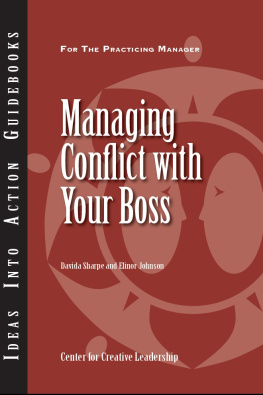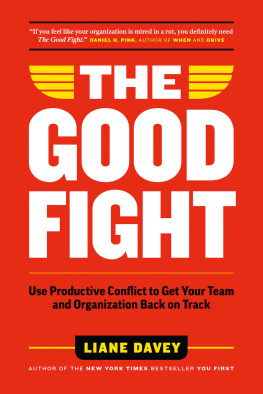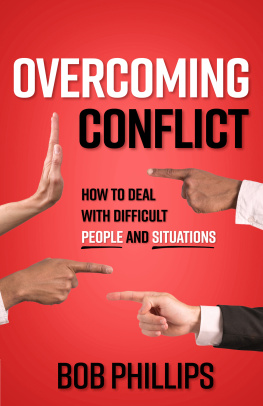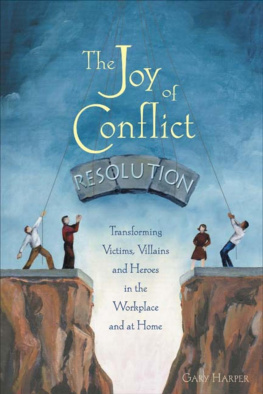How to Manage Conflict
in the Organization
Second Edition
How to Manage Conflict
in the Organization
Second Edition
Gregg Lee Carter
Joseph F. Byrnes

2006 American Management Association. All rights reserved. This material may not be reproduced, stored in a retrieval system, or transmitted in whole or in part, in any form or by any means, electronic, mechanical, photocopying, recording, or otherwise, without the prior written permission of the publisher.
ISBN: 0-7612-1426-7
Printed in the United States of America.
Contents
About This Course
Few skills are more important to your success as a manager than the ability to diagnose and resolve workplace conflicts. Conflict managementthe ability to respond to on-the-job conflicts quickly and effectively and resolve them in a positive waypaves the way for higher productivity and more effective communication. How to Manage Conflict in the Organization, Second Edition, will provide you with the concepts and skills you need to transform conflict into a positive, productive force.
This new edition equips you with the strategies, tactics, and insights you need to gain control of tough conflict situations. Youll discover how to spot potential interpersonal conflictsand defuse them before they flare up. Youll learn how to resolve conflicts positively by using proven principled negotiation techniques. Youll understand how, when, where, and why to apply the five favored conflict resolution approaches. A variety of self-assessments, interactive exercises, and practical tools help you develop the skills you need to ensure success.
New topics in this edition include the impact of the changing workforce on conflict resolution (issues related to discrimination, retaliation, hostile environments, and harassment); when to consult with human resources about a conflict resolution situation; the growing importance of alternative dispute resolution (ADR) and an introduction to the most commonly used ADR techniques; and conflict resolution issues in electronic communication. Youll also find tools designed to give managers quick and easy access to key conflict resolution information, strategies, and techniques.
How to Manage Conflict in the Organization, Second Edition, enables you to use creative thinking to transform conflict into an opportunity for both parties in a conflict to achieve their goals and contribute to the growth of the organization.
Dr. Gregg Lee Carter is professor of sociology and chair of the Department of History and Social Sciences at Bryant University in Smithfield, Rhode Island. He is an expert on conflict and has had articles published on this topic in the Journal of Conflict Resolution, Sociological Focus, Sociological Forum, Sociological Inquiry, Sociological Quarterly, and Sociological Viewpoints, among many other scholarly journals. In the past decade, he has authored or edited nineteen books, and he has presented more than four dozen papers at professional conferences, seminars, and workshops.
Dr. Carter is the former president of the New England Sociological Association and is a past associate editor of Teaching Sociology. He is the recipient of the New England Sociological Associations Sociologist of the Year award, as well as an Outstanding Contribution to Instruction award from the American Sociological Association. He is a frequent contributor to the media; his editorials, opinions, and quotations on social conflict and contemporary social issues appear in newspapers throughout the country. He has also been a frequent radio talk-show guest and has been featured on the American Business Radio Network. Dr. Carter is a former member of the faculty contract-negotiation team at Bryant University and has spent many long hours in negotiation preparation work, as well as in actual negotiations. As a longtime chair of his department, he has been involved in all forms of conflict resolution, including formal arbitration and the many faces of principled negotiation, which is the core approach to conflict resolution presented in this course.
Dr. Carter earned three graduate degrees at Columbia University, where his doctoral dissertation was on the social and economic roots of racial conflict.
Dr. Joseph F. Byrnes, author of the American Management Association Self-Study course Managing and Resolving Conflict, on which this course is based, is currently Professor of Management at Bentley College in Waltham, Massachusetts. He is an expert in the area of human resources management, with particular interest in labor relations, collective bargaining, and negotiating strategy and tactics. Dr. Byrnes has contributed articles to the Journal of Management Education, Strategic Planning Management, Business Horizons, Management World, Negotiation Journal, Trainers Workshop, Personnel Administrator, Personnel Journal, and the Journal of Collective Negotiations. He has written three audiocassette/workbook programs for the American Management Association, emphasizing first-line management and middle-management skill building. Dr. Byrnes is also the author of the leaders guide to the AMAs film What They Never Told You About Supervising.
Dr. Byrnes did his graduate training at Northwestern University, where he earned his master of arts and doctor of philosophy degrees.
How to Take This Course
This course consists of text material for you to read and three types of activities (the pre- and post-test, in-text exercises, and end-of-chapter review questions) for you to complete. These activities are designed to reinforce the concepts introduced in the text portion of the course and to enable you to evaluate your progress.
P RE -AND P OST -T ESTS
Both a pre-test and post-test are included in this course. Take the pre-test before you study any of the course material to determine your existing knowledge of the subject matter. Submit one of the scannable answer forms enclosed with this course for grading. On return of the graded pre-test, complete the course material. Take the post-test after you have completed all the course material. By comparing results of the pre-test and the post-test, you can measure how effective the course has been for you.
To have your pre-test and post-test graded, please mail your answer forms to:
Educational Services
American Management Association
P.O. Box 133
Florida, NY 10921
All tests are reviewed thoroughly by our instructors and will be returned to you promptly.
T HE T EXT
The most important component of this course is the text, where the concepts and methods are presented. Reading each chapter twice will increase the likelihood of your understanding the text fully.
We recommend that you work on this course in a systematic way. Reading the text and working through the exercises at a regular and steady pace will help ensure that you get the most out of this course and retain what you have learned.
In your first reading, concentrate on getting an overview of the chapter content. Read the learning objectives at the beginning of the chapter first. They will act as guidelines to the major topics of the chapter and identify the skills you should master as you study the text. As you read the chapter, pay attention to the headings and subheadings. Find the general theme of each section and see how that theme relates to others. Dont let yourself get bogged down with details during the first reading; simply concentrate on understanding and remembering the major themes.
Next page






